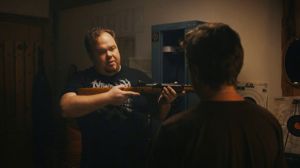With your ruddy round face, beady eyes, and quadrangular military flattop, you epitomized the all-American Norman Rockwell ideal of the asshole older brother. There was no cleverer bit of casting in Chris Colombus's Home Alone than giving you the role of Buzz McAllister. You loomed and leered and spit sarcasm like an old pro. In the cinematic pantheon of teenage antagonists, it took you only a few minutes onscreen to become iconic.
Yeah, I know you get this a lot, but don't worry--it's going someplace good.
Show business isn't kind to child actors; crueler still to child actors of your type: the sickly-thin best pal, the portly comic relief, the villainous ginger--you know, the character actors. Just to maintain your self-respect is accomplishment enough, let alone continuing to work regularly in front of the camera.
When you show up about halfway through Jeremy Saulnier's quiet, contemplative revenge thriller Blue Ruin, I didn't recognize you. But there was something familiar about your face, your voice, your posture; like an old classmate whose name I couldn't quite recall (and that's indeed who you play: an old classmate of Dwight,the film's twitchy, half-homeless scavenger protagonist). By that time, Saulnier has firmly established Blue Ruin's mood. Barren, deliberate. All the colors feel like faded pastel. The musical score consists of a few throbbing synth notes. The first five minutes pass without dialogue, and just when it seems like the talky part of the plot has kicked in, we get another long sequence that occurs in near-silence (Dwight even says, after reuniting with his long-lost sister and choking out a few syllables: "Sorry, I'm not used to talking this much.")
What I mean to express is that this is a film that relies heavily its performances. The story unfolds without exposition or context - what happens onscreen is the story - and there are no stylistic tricks with the camera or sound design to obscure the action onscreen. Much will be written, I'm sure, of Macon Blair as Dwight, and deservedly so. It's the sort of quiet, anxious performance with which Hollywood actors are always trying (and mostly failing) to bait end-of-the-year awards shows; he's sort the anti-Terminator, tripping and flailing his way through violent confrontations, never quite sure if he wants to continue the spree he's stared. Amy Hargreaves, too, as Dwight's sister, brings the sort of jittery energy that makes you wonder why you don't see her in more stuff.
And then, you.
What shocked me most wasn't to learn that you were Buzz McAllister, all-time great family film jerk, but rather to learn that you were an actor at all. Your performance was so precise, felt so settled within the world of the story, that I was sure you were an amateur, a local dude cast for his looks, for his accent, for his familiarity with guns (has there been a more lovable gun-nut than Ben Gaffney, the Yoda-like character you play in this flick?). Naturalism can be an overhyped virtue in acting: Andrew Garfield thinks he's doing it in the new Spider-Man films, when instead he's sort of squirming inside his own skin and faking improvised dialogue with choreographed stutters (you would have made a better Peter Parker than he does); someone like Tom Hardy does it well by not trying to do it at all.
But it's not simply that you're well-cast. You're the catalyst of the most satisfying scene of the film; a single action that changes the nature of your character completely - from goofy metalhead recluse to sage advisor - and your performance is perfectly conscious of it. You bring humanity to a type of character who usually seems more a product of the prop department, or a crutch for the screenwriter to move the story along. This sort of depth of character is true of the whole film. It's a revenge thriller that feels human, that is conscious of consequences, that keeps its motives simple and its repercussions complicated.
As far as I'm concerned, the new career-defining Devin Ratray movie quote is no longer: "I wouldn't let you sleep in my room if you were growing on my ass." It's: "The coyotes will take care of that."
Sincerely,

Jared







